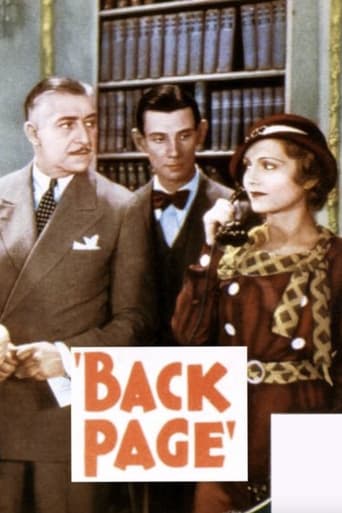mark.waltz
A great performance by Peggy Shannon elevates this newspaper drama to make it a hidden gem amongst the thousands of low budget films to come out of Hollywood's B studios in the golden age of movie making. It's the story of an aging newspaper owner (the lovable Claude Gillingwater) who fears that a local big wig is out to take over his paper. In a last ditch effort to save his paper from going under the thumb of somebody who would surely ruin it, he brings in a New York City reporter named Jerry to be its new editor, unaware that Jerry is actually a woman! She's pretty tough, too, and takes on the ruthless Edwin Maxwell without fear, winning the respect of Gillingwater and his staff as well as the townspeople when she exposes a fraud concerning a local oil well which many people invested their life savings in.Sterling Holloway gives a fine comic performance as a rather effeminate and delightfully eccentric co-worker at the newspaper, and Russell Hopton is fine as Shannon's love interest who has more than a passing interest in what happens concerning the actions of the ruthless Maxwell. Ottola Nesmith, as the newspaper's secretary, will steal your heart as she overhears what is going on concerning the oil well and reacts to it. There's also a fascinating scene with the townsfolk discussing the oil well's sudden success. It is so obvious that these were non-actors, just real people pulled off the street, because the lack of annunciation on the old lady's disinterest in gaining money is so honest and refreshing. These are things you don't see in movies from the main studios that make the poverty row filmmakers sometimes a lot more interesting and realistic.
JohnHowardReid
This is the only credit for a gent named Anton Lorenze. I suspect that name is a pseudonym as the direction is far too able to be the work of someone who walks in off the street. No-one, not even a producer on Poverty Row is going to entrust even a ten thousand dollar production to someone with absolutely no credits at all – unless of course Lorenze is himself an executive of the movie company and/or he has stage credits. I also notice that one reviewer picked fault with Peggy Shannon's performance, but I thought she was wonderful and carried the role off perfectly. The person I didn't like was Sterling Holloway. I'm not a fan of Sterling's, I admit, but in this movie he seemed to me to be particularly out of place. Claude Gillingwater, as usual, was a delight in a made-to-order role, while Edwin Maxwell did his customary convincing stint as the villain. Available on a very good Alpha DVD.
Paularoc
Peggy Shannon did a nice job as a reporter, Jerry Hampton, who was fired from a big city newspaper and becomes the editor of a small town paper. Shannon has a certain charm and sparkle that enhance the movie; her reporter character is not rough edged or somewhat brassy like a Torchy Blane but neither is she silly or vapid. She also has a certain comedic touch - I thought the extended scene between Sterling Halloway and her was funny and well done by both of them. The movie starts and finishes with showing the impact of power and influence on what stories newspapers will print. I can't decide if the ploy Jerry uses at the end of the movie to ensure a happy ending for the good guys was a case of quite rightly and nicely hoisting the nasty guys on their own petards or unethical. Worth a watch.
kidboots
Peggy Shannon's career may have been almost at an end by 1934 but her films with independents ("False Faces", "Deluge", "The Devil's Mate") gave her some of her more substantial roles. "The Back Page" is no exception being about a female editor who exposes the corruption that is rife in a small town. Films had come quite a way in the couple of years since "Exposure" which showed Lila Lee, owner of a struggling newspaper, as being almost a damsel in distress who caves in when macho journalist Walter Byron comes along.Gorgeous Peggy Shannon plays ace reporter Jerry Hanson who is devastated when her first big scoop is ordered to be killed because one of the recipients is very influential in the city. In disgust she heads to the hometown of her reporter boyfriend (always reliable Russell Hopton) to take up the editor's job of the rag, tag and bobtail local "The Apex Advocate". Once she overcomes the old owner, Sam Webster's (Claude Gillingwater) objections that because she is a girl, she will be no good, Jerry finds a huge story that is being smothered, once again because of the undue influence of the town's leading citizen, Martin Blake (who else but Edwin Maxwell). He has put about a story that the town is sitting on oil and encouraged most of the town's people to put their life savings into the stock. Webster doesn't believe it but he is over a barrel; he owes Blake money so the paper can't afford to be impartial. Blake is not happy with the spruced up Advocate, all thanks to snappy Jerry who believes there is oil in the town but now Blake is putting about that he will do the right thing by the town by buying up their "worthless" stock so he doesn't see them out of pocket!!This is just a grand little story and proves once again that poverty row didn't necessarily mean poverty in production or talent and could sometimes be more cutting edge in dealing with the woman's angle than some of the more prestigious studios. Aside from those stars mentioned there is the always quirky, always welcome Sterling Holloway with his "I'm Bill Giddings - that's Giddings with a zzzzz"!!!


